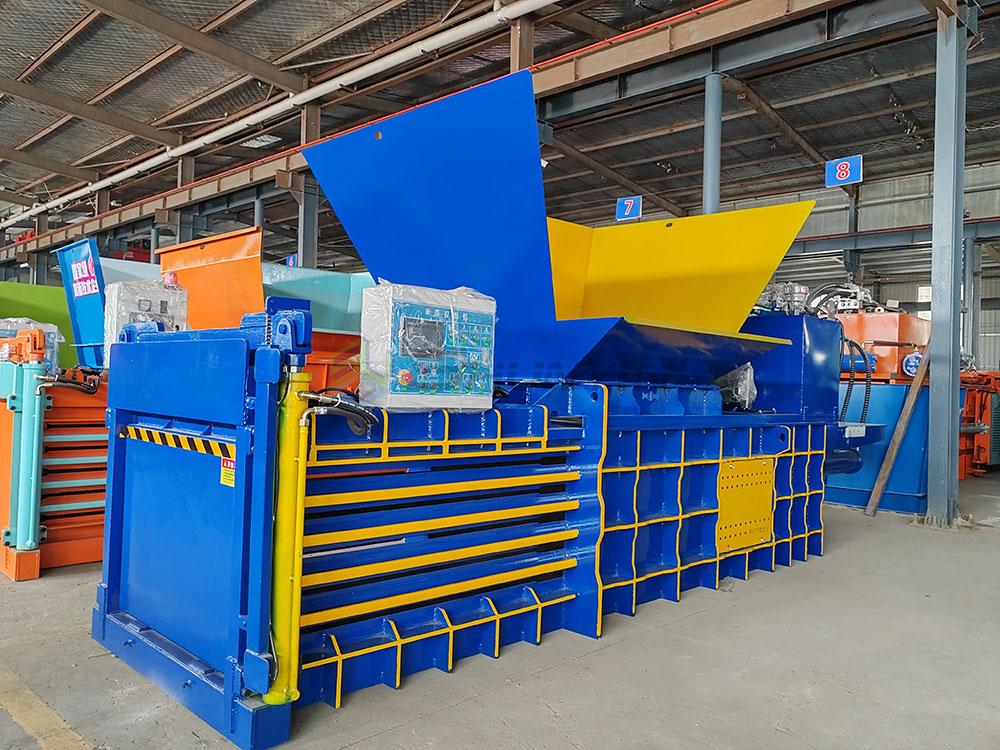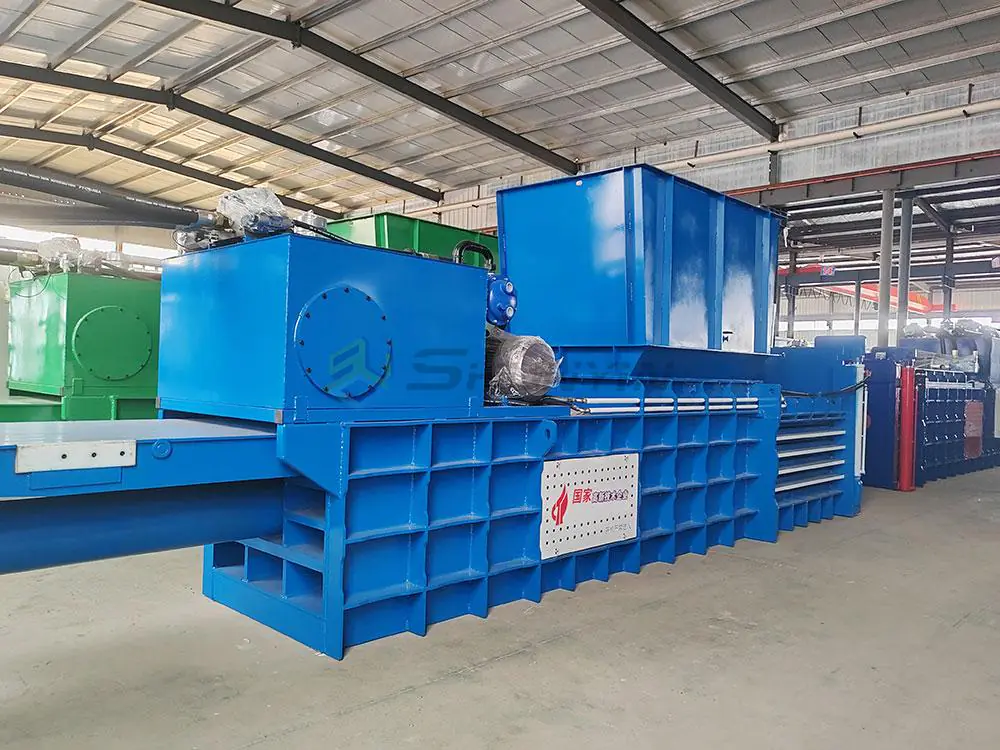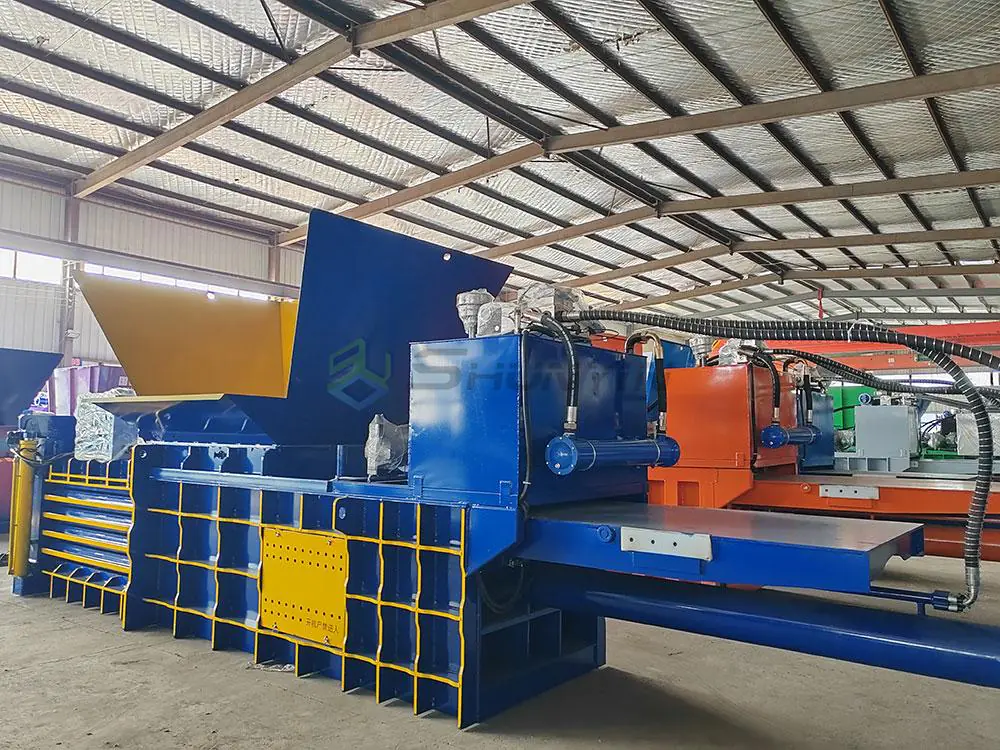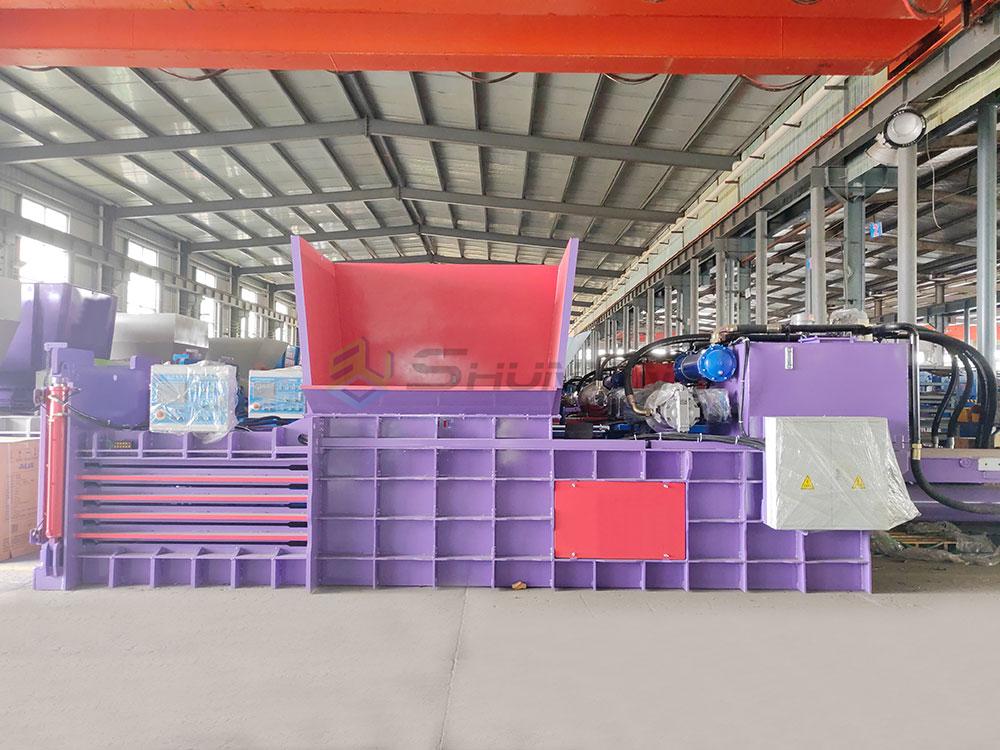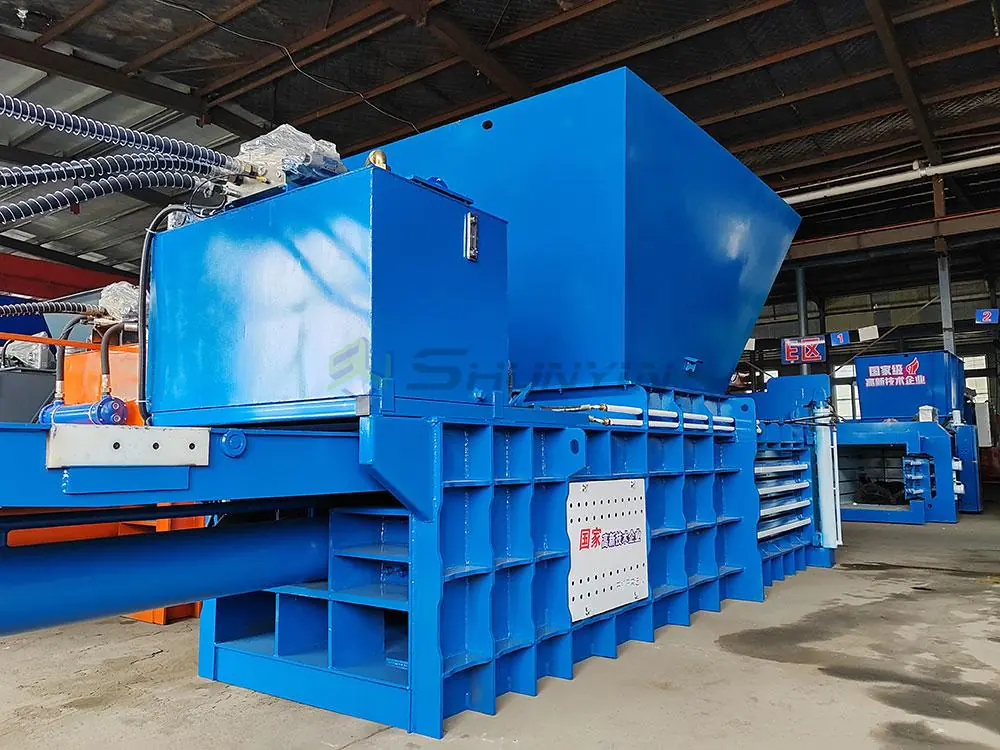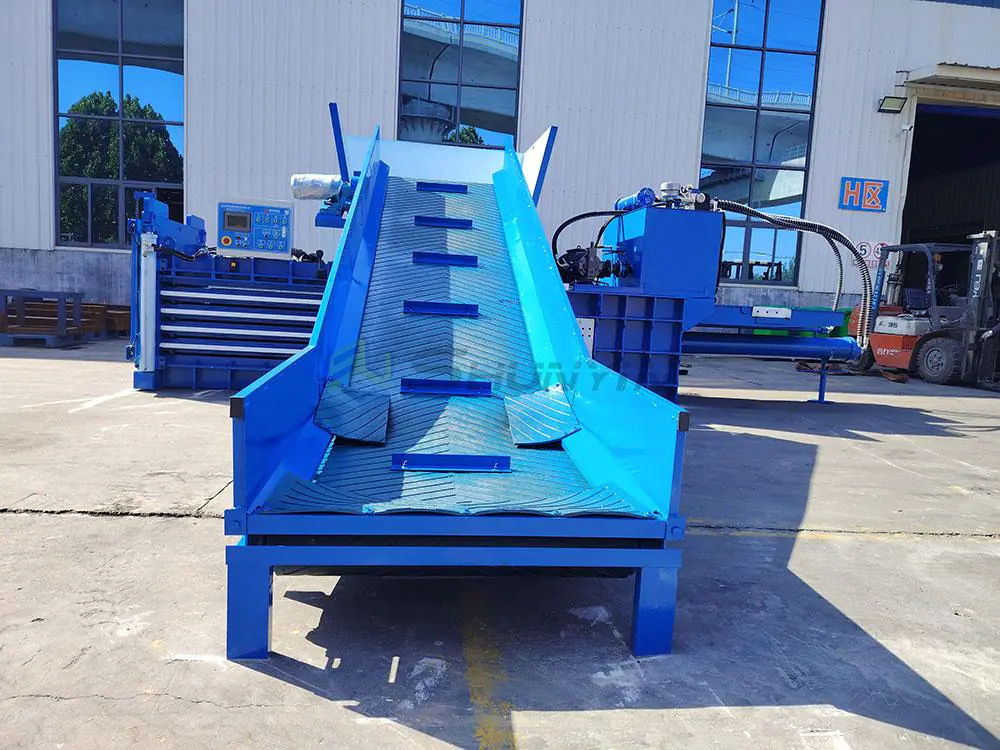
Managing waste paper efficiently is a challenge many businesses face. Piles of discarded paper take up valuable space and increase disposal costs. Implementing a horizontal baling machine can transform your waste management process, making it more efficient and cost-effective.
Horizontal baling machines are ideal for waste paper management because they efficiently compress large volumes of paper into dense bales, reducing storage space and transportation costs. Their high compaction force ensures paper is tightly packed, making recycling more efficient. The automatic tie system minimizes manual labor, and the machines are designed for continuous operation, handling high throughput. This makes them perfect for businesses with significant paper waste, improving recycling efficiency and lowering overall waste management costs.
When I first introduced a horizontal baling machine to our office, the difference was immediate. Not only did our storage area become more organized, but our waste disposal costs also dropped significantly.
Can you put paper in a baler?
Absolutely, you can put paper in a baler. Baling paper is one of the primary uses of baling machines, especially in recycling operations and office waste management.
Yes, paper can be baled efficiently using a baler, making it easier to store and transport for recycling purposes.
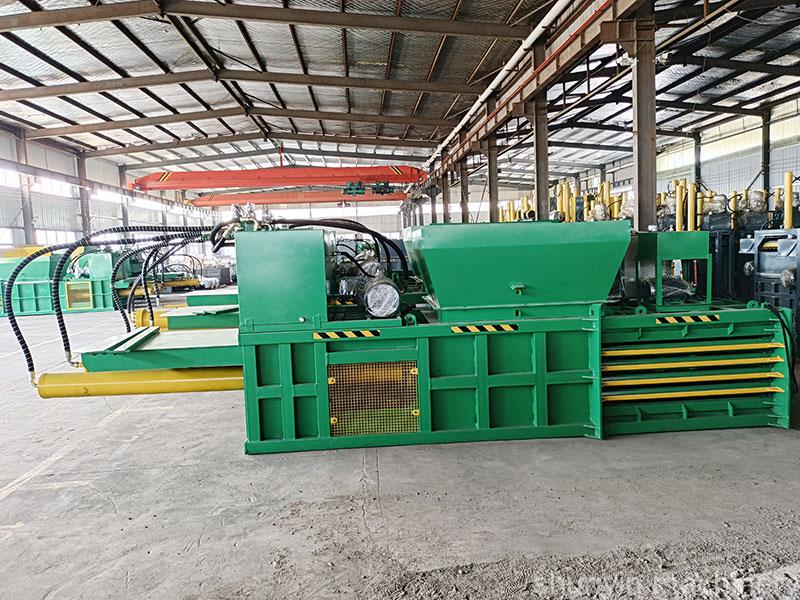
Using a baler for paper has streamlined our recycling process. Instead of dealing with loose stacks of paper, we now handle neatly compacted bales that are easy to manage.
Types of Paper Suitable for Baling
Different types of paper can be baled, each requiring specific handling to ensure optimal compression and recycling efficiency.
Office Paper
Standard office paper, including printer paper and notebooks, is commonly baled for recycling. It is easily compressed and transported in large volumes.
Cardboard
Corrugated cardboard and paperboard are also ideal for baling. These materials are bulky and take up significant space, making baling an effective solution for storage and transport.
Mixed Paper
Mixed paper waste, which includes newspapers, magazines, and other assorted paper products, can be baled together. Proper sorting before baling ensures higher recycling quality.
| Paper Type | Baling Considerations |
|---|---|
| Office Paper | High volume, easy compression |
| Cardboard | Bulky, requires strong binding |
| Mixed Paper | Sort for recycling quality |
Benefits of Baling Paper
Baling paper offers several advantages that enhance waste management processes.
Space Saving
Compressed paper bales take up significantly less space compared to loose paper, freeing up storage areas for other uses.
Cost Efficiency
Reduced volume means lower transportation and disposal costs, making the recycling process more economical.
Improved Handling
Baled paper is easier to handle, transport, and store, reducing the labor required for waste management.
Personal Experience
After implementing a baler for our office paper waste, we noticed a 60% reduction in storage space needed for paper disposal. This change not only improved our workspace but also lowered our recycling costs.
How much does a recycling baler machine cost?
The cost of a recycling baler machine varies based on its features, capacity, and brand. Understanding these factors can help you make an informed investment.
Recycling baler machines typically range from $10,000 to $50,000, depending on their capacity, features, and the brand’s reputation.
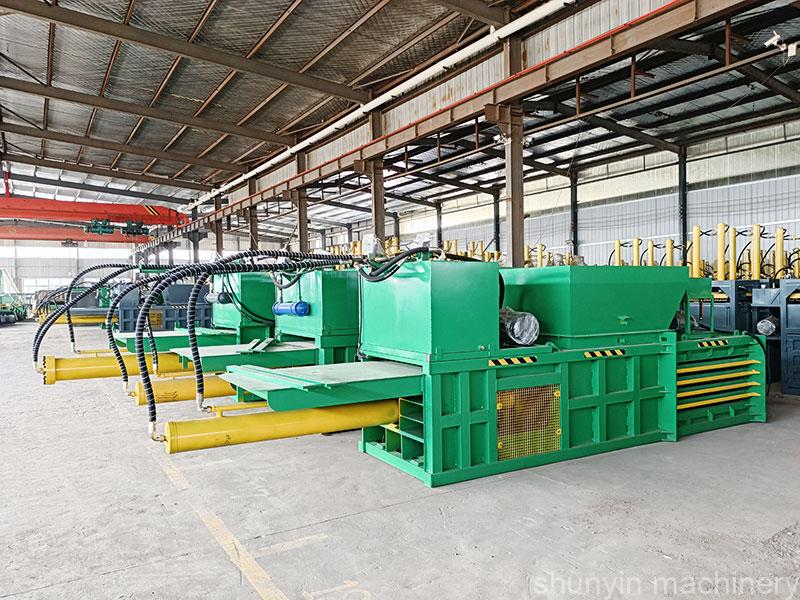
When budgeting for a baler, it’s essential to consider not only the initial purchase price but also the long-term maintenance and operational costs.
Factors Influencing Baler Pricing
Several elements contribute to the overall cost of a baler machine:
Capacity
Higher-capacity balers that can handle larger volumes of paper will generally cost more than smaller models.
Features
Advanced features such as automated controls, high compression ratios, and enhanced safety mechanisms increase the price.
Brand and Warranty
Established brands with a reputation for reliability and longer warranty periods typically command higher prices.
| Factor | Impact on Pricing |
|---|---|
| Capacity | Higher capacity increases the cost |
| Features | More advanced features add to the price |
| Brand Reputation | Trusted brands charge a premium |
| Warranty Length | Longer warranties may increase the initial price |
Cost Breakdown Example
A mid-range horizontal baler might cost around $25,000. This includes essential features suitable for medium-sized operations. Adding advanced features or increasing capacity can push the price closer to $40,000.
Personal Experience
Investing in a $30,000 baler seemed steep initially. However, the reduction in waste disposal costs and the increased efficiency made it a worthwhile investment, paying for itself within two years.
What is the machine that crushes cardboard called?
The machine that crushes cardboard is commonly known as a cardboard crusher or cardboard baler. These machines are essential in managing and recycling cardboard waste efficiently.
A cardboard crusher, also referred to as a cardboard baler, is designed to compress cardboard into compact bales, making it easier to store and transport for recycling.

Using a cardboard crusher has significantly improved our waste management system, allowing us to handle larger volumes of cardboard with ease.
How Cardboard Crushers Work
Understanding how these machines operate helps in optimizing their use and maintenance.
Crushing Mechanism
Cardboard crushers use powerful motors and hydraulic systems to crush and compress cardboard into dense bales.
Baling Process
After crushing, the machine binds the cardboard with straps or wire, securing it into manageable bales for easy handling and transport.
Ejection System
Once the bale is formed, it is automatically ejected from the machine, ready for storage or transportation to recycling facilities.
| Component | Function |
|---|---|
| Crushing Mechanism | Compresses cardboard into dense bales |
| Baling Process | Secures compressed cardboard with bindings |
| Ejection System | Removes finished bale from the chamber |
Benefits of Using a Cardboard Crusher
Cardboard crushers offer several advantages that enhance waste management efficiency.
Space Optimization
Compressed bales occupy less space, allowing for better storage and reducing clutter in workspaces.
Cost Savings
Lower transportation costs due to reduced volume and weight of the bales.
Environmental Impact
Facilitates recycling efforts by making it easier to collect and transport cardboard waste.
Personal Insights
Implementing a cardboard crusher in our office waste management system reduced our storage space for cardboard by 70%. This efficiency allowed us to allocate more space for productive activities and reduced our recycling costs.
What is a paper bailer?
A paper bailer is a specialized machine designed to compress and bind paper waste into compact bales, facilitating easier storage and transportation for recycling purposes.
A paper bailer is a device that compresses loose paper into tightly bound bales, making it easier to handle, store, and transport for recycling or disposal.

Using a paper bailer has streamlined our recycling process, allowing us to manage paper waste more efficiently and cost-effectively.
Components of a Paper Bailer
Understanding the main components of a paper bailer helps in proper operation and maintenance.
Compression Chamber
This is where the paper is fed into the machine and compressed into bales using hydraulic pressure.
Binding Mechanism
After compression, the binding mechanism secures the bale with straps or wire, ensuring it remains intact during handling and transport.
Control System
Modern paper balers come with automated control systems that manage the compression and binding processes, enhancing efficiency and consistency.
| Component | Function |
|---|---|
| Compression Chamber | Compresses paper into dense bales |
| Binding Mechanism | Secures bales with straps or wire |
| Control System | Automates the compression and binding process |
How Paper Balers Enhance Recycling
Paper balers play a significant role in improving recycling processes by making paper waste easier to manage.
Increased Efficiency
By compressing paper into bales, balers reduce the volume of waste, making it easier and faster to transport to recycling facilities.
Cost Reduction
Lower transportation and disposal costs are achieved through reduced waste volume, leading to significant savings.
Improved Recycling Quality
Uniform bales ensure that paper waste is processed more efficiently at recycling centers, improving the overall quality of recycled materials.
Personal Experience
After introducing a paper bailer in our office, we saw a 50% reduction in paper waste storage space. This improvement not only organized our workspace but also cut down our recycling expenses by a substantial margin.
Conclusion
Horizontal hydraulic balers are invaluable tools for managing waste paper across various industries. By understanding their functionality, maintenance needs, and the benefits they offer, businesses can optimize their waste management processes, reduce costs, and promote sustainability. Whether it’s compressing office paper, crushing cardboard, or handling large volumes of recyclable materials, horizontal baling machines provide efficient and effective solutions. Investing in the right baler and implementing energy-saving strategies ensures long-term performance and significant return on investment, making it a smart choice for any company committed to efficient waste management and environmental responsibility.


